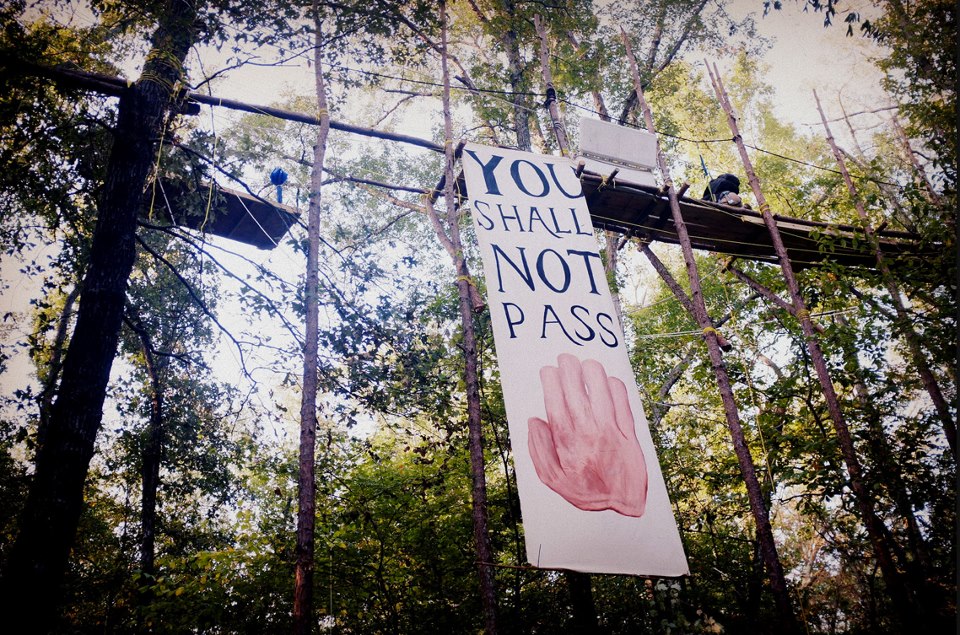
Capitalism is killing the world, driving climate change and expanding sacrifice zones such as the atmosphere, Nigeria’s oil fields, Chevron’s "Rainforest Chernobyl" in Ecuador and Alberta’s tar sands, Naomi Klein asserts in her new book, "This Changes Everything: Capitalism vs. Climate."
The book, published last month, asserts there cannot be infinite growth of these sacrifice zones on a finite planet. Instead, we must rethink our relationship with Earth to become stewards, moving away from the idea that we are its masters. The world, Klein writes, is not a "bottomless vending machine."
Klein highlights multiple, viable, ecological and equitable alternative systems to today's capitalism. But to achieve this, a battle of ideas must be won to erode the current system’s legitimacy. Fortunately for humanity, she says, capitalism is on ever more shaky ground challenged by an ever-growing movement of movements that wants to bail out the planet. The outcome, though, is by no means certain.
Frequently referring to her own experiences, she begins her book with a revelation. Before 2009, Klein was a climate denier. She did not dispute man-made climate change, but found diversions in order to avoid addressing the issue head-on. For instance, she expected that scientists and environmentalists would solve it, and considered economic injustice more important.
Klein's personal starting point is valuable for the pro-planet movement, showing the walls that are built by the system – and ourselves – to stop climate action. She then explains where the doors are located.
Her paradigm shifting moment occurred in 2009 while she was speaking to Angelica Navarro Llanos, Bolivia’s ambassador to the World Trade Organization, who explained to her that climate change is actually an opportunity to solve multiple crises in the world, such as inequality and failures in democracy. Calling this “Decade Zero,” Klein says the situation must now be sorted within the next 10 years.
The alternative is not pretty. If capitalism beats the climate, it means famine, dramatic sea-level rise and increasing weather disasters. Worse still, capitalism may survive on a mostly dying planet, where corporations hold on to ever scarcer resources while suppressing an ever more desperate majority.
Looking at the individuals and institutions blocking the momentum to deal with climate change, Klein shines a light on neoliberal thinktanks among others. She cites how big oil investments pedal ideas like "climate change is a plot to redistribute wealth and end capitalism." Her response to them, ironically, is that they are right – in the sense that sorting out the climate crisis will necessarily pivot on a profound re-balancing of society.
Klein is equally critical of Big Green, large environmental organizations like the Environmental Defense Fund, which went from promising beginnings only to fall under the neoliberal profit-motive spell when they accepted money from Big Oil. The Nature Conservancy even incredibly started extracting oil itself.
To solve climate change, much of the Big Green alliance has supported cap and trade legislation, which Klein categorically dismisses as a failure. She also attacks wholesale the idea that billionaires like Richard Branson will save the day with techno-fix ideas. Klein suggests that tech-reliant climate solution schemes have been little than hot air, while great PR for Big Oil and the other mass polluters.
Capitalism is catalyzing climate change, and Klein charts back to how this started with the colonial powers during the steam age. Since then, 20% of the global population has emitted 70% of the human-added greenhouse gases.
More lately, Klein writes, neoliberal globalization accelerated the problem. With chronically poor timing, just as climate change became a global issue in the late 1980s, the "End of History" neoliberal mindset also took over as the Berlin Wall fell and Communism ended in Eastern Europe. This heralded a triumphant new era of free trade, with governments proclaiming “There Is No Alternative” while free trade agreements enabled Big Oil to attack renewable energy and production was outsourced to the cheapest, most polluting economies.
Klein’s intricate explanation of the causes of climate changes serves two vital functions: to show the ways we need to reverse direction, and to show who the culprits – the polluters – are. In order to have a fair international agreement that adequately addresses the climate crisis, Klein asserts it cannot be shouldered by citizens – as with the bank bailouts – but must be based on the principle that the polluter pays. Those who profited through the creation of the crisis, she maintains, must now be responsible for solving it: through financial transaction tax, ending tax havens and loopholes, taxing billionaires, slashing military budgets, taxing carbon, and ending fossil fuel subsidies.
All of this would create funds to be reinvested in a great transition that includes locally owned renewable energy, mass transit systems and retrofitting buildings for efficiency. These alternatives have been mapped out and, with political will, can be reached within 15 years. A future city in this vision, from a transport perspective, might look like Stockholm, which has effective public transit, walkways and cycle-path provisions.
Throughout the pages of her book, Klein’s real examples explain sophisticated systemic failures and alternatives. The Pacific island of Naura exemplifies the problem of extractivism, demonstrating in basic terms why we need to question our basic methods of consumption – a point often missing from the ecological debate. Once rich in biodiversity, the island has been mined from the inside out. It may now be drowned from the outside by rising tides provoked by global warming.
After ecological collapse, Naura’s problems were compounded by continuing with the extractive mindset; as a tax haven it encouraged corruption and poverty, only to be used by the brutal Australian asylum system as an offshore detention center. To prevent the world from following Naura's example, Klein asserts the key battleground is "Blockadia" – a fluid and growing space of civil disobedience camps, blockades, sit-ins, lock-ons and other direct actions gaining worldwide attention against the extractive industries.
Crucial areas where Blockadia is succeeding include the anti-Keystone XL pipeline and the numerous protection camps that have sprung up nationally and globally against fracking. Blockadia’s heritage is in indigenous sovereignty struggles, such as the battle waged by the Ogoni of Nigeria against Shell Oil. "Extraction stops here, now," is the message from these diverse spaces, and Klein believes these movements are threatening capitalism at its core: as capitalism’s drive for growth turns more and more of the world into sacrifice zones, so too does Blockadia grow in parallel.
Just as the global South was ravaged over decades by debt crisis, sacrifice zones are now more common in the North, Klein explains. Indigenous struggles are heralded as the best hope for the climate change movement, as the most carbon-rich and eco-diverse systems are native peoples’ lands, which can still be protected by indigenous land rights. For the world to make a U-turn from its extractivist, destructive course, a crucial breakthrough is to stop destroying the very people who show the alternatives.
Blocking extractive industries, though, is not the only solution, and Klein in her lengthy work mentions many more. One is the fossil fuel divestment movement, which is gaining influence alongside the investment in renewables and the de-legitimization of Big Oil – somewhat in the way that cigarette companies were de-legitimized over decades of government health campaigns.
Mapping the battle lines of climate change with precision and insights makes Klein a leading global thinker. In This Change Everything, she explains that victory for the planet and its people rests on whether these ideas inspire a mass public movement that can ally with the many social justice movements already underway. Klein’s urges readers to go to Blockadia. As she says: "It’s systemic change or climate change."
3 WAYS TO SHOW YOUR SUPPORT
- Log in to post comments

















